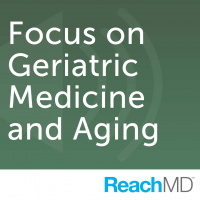Focus On Geriatric Medicine And Aging
- Autor: Vários
- Narrador: Vários
- Editora: Podcast
- Mais informações
Informações:
Sinopse
As our population grows older, new medical innovations serve to preserve the symbiosis of the body and mind. Are novel therapies for Alzheimer's on the horizon? How do we approach joint replacement surgery for an active 92-year-old? What about research frontiers focused on promoting longevity? ReachMD gathers top medical experts and opinion leaders for a month-long discussion of geriatric medicine and the aging process.
Episódios
-
GlyNAC and Healthy Aging: A Review of New Clinical Data
10/03/2023Guest: Rajagopal Sekhar, MD Clinicians are still working to understand the mechanisms behind age-related declines and what interventions might help promote healthy aging. Could supplementation with the nutritional compounds glycine and n-acetylcysteine (GlyNAC) play a role by improving intracellular antioxidant levels? Dr. Rajagopal Sekhar shares the latest clinical data on GlyNAC supplementation in older adults.
-
Best in Show: The Health Benefits of Therapy Dogs
11/12/2017Host: Brian P. McDonough, MD, FAAFP Several studies have shown that therapy dogs help to reduce people’s pain levels and anxiety. Therapy dogs have also been found to increase patients’ physical, mental, emotional and social states and improve their quality of life. Host Dr. Brian McDonough talks with David Frei, co-creator of Angel on a Leash, a charity supporting therapy dog programs that serve health care facilities, about how therapy dogs bring comfort, affection and happiness to people in confined living situations. Frei is the former host of The Westminster Kennel Club Dog Show and expert analyst for The National Dog Show on NBC Thanksgiving Day.
-
Treating Hip Fractures in Elderly Patients: An Orthopedic Surgeon's Perspective
27/10/2017Host: Brian P. McDonough, MD, FAAFP Out of the approximately 340,000 hip fractures that occur in the US each year, 9 out of 10 of them happen to people older than 65. Hip fractures in an older population can result in significant complications including pneumonia and blood clots, among others. Host Dr. Brian McDonough sits down with Dr. Derek Donegan, Assistant Professor of Orthopedic Surgery in the Division of Orthopedic Trauma at the Hospital of the University of Pennsylvania to talk about some of the challenges physicians face when treating hip fractures in elderly patients.
-
End-of-Life Care: A Physician's Guide to Helping Families
24/03/2017Host: Jennifer Caudle, DO The burden of deciding end-of-life care often falls on family and friends when patients are no longer able to make decisions regarding their own care. What do physicians need to know when guiding families through these tough situations? Host Dr. Jennifer Caudle is joined by Dr. Marianne Holler, Medical Director of Hospice and Palliative Programs for the VNA Health Group of New Jersey. They talk about what physicians can do to aid families when faced with end-of-life decisions.
-
Keeping Love Alive as Memories Fade: The 5 Love Languages and the Alzheimer's Journey
23/01/2017Host: Maurice Pickard, MD Dr. Maurice Pickards talks with Dr. Edward Shaw about his book Keeping Love Alive as Memories Fade: The 5 Love Languages and the Alzheimer's Journey. Dr. Shaw shares how love can lift a corner of dementia’s dark curtain to cultivate an emotional connection amid memory loss. The book provides focused help for those feeling overwhelmed by the relational toll of Alzheimer’s.
-
Brain Food for Seniors: Dietary Impacts on Cognition and Longevity
16/01/2017Host: Kathy King, RDN Can good nutrition improve cognition in the aging brain, as well as expand life spans in older adults? Host Kathy King speaks with dietitian and nutrition consultant Matthew Ruscigno about the latest research and subsequent dietetic recommendations aimed at seniors. They discuss which foods and dietary practices are now associated with helping seniors preserve cognition and live longer.
-
Tissue-Specific Protein Clusters May Help Predict Risk of Alzheimer’s Disease
25/10/2016A protein homeostasis signature in healthy brains recapitulates tissue vulnerability to Alzheimer’s disease Rosie Freer, Pietro Sormanni, Giulia Vecchi, Prajwal Ciryam, Christopher M. Dobson, and Michele Vendruscolo Science Advances 10 Aug 2016: Vol. 2, no. 8, e1600947 DOI: 10.1126/sciadv.1600947 Abstract: In Alzheimer’s disease, aggregates of Aβ and tau in amyloid plaques and neurofibrillary tangles spread progressively across brain tissues following a characteristic pattern, implying a tissue-specific vulnerability to the disease. We report a transcriptional analysis of healthy brains and identify an expression signature that predicts—at ages well before the typical onset—the tissue-specific progression of the disease. We obtain this result by finding a quantitative correlation between the histopathological staging of the disease and the expression patterns of the proteins that coaggregate in amyloid plaques and neurofibrillary tangles, together with those of the protein homeostasis components that regula
-
The Astute Primary Care Clinician's 3 Keys to Improving Alzheimer's Care
02/10/2016Host: Matt Birnholz, MD Guest: Marwan Noel Sabbagh, MD, FAAN, CCRI Dr. Marwan Sabbagh, Professor of Neurology and Chief of the Memory Disorders Division at Barrow Neurological Institute, describes some of his key priorities for the current and future state of Alzheimer’s care. Uncover the truth about Alzheimer's in the non-certified educational series, Alzheimer's Disease: Towards Earlier Detection
-
Screening & Detection Tests for Alzheimer's Disease: The Benefits & Costs
02/10/2016Host: Matt Birnholz, MD Guest: Douglas Scharre, MD, CMD Dr. Douglas Scharre, Professor of Clinical Neurology and Psychiatry with the Center for Cognitive and Memory Disorder at The Ohio State University Wexner Medical Center, speaks to the methods used for early detection of Alzheimer’s Disease, and their respective advantages vs costs in clinical practice. Uncover the truth about Alzheimer's in the non-certified educational series, Alzheimer's Disease: Towards Earlier Detection
-
Why Patients Delay Seeking an Early Diagnosis for Alzheimer’s Disease
02/10/2016Host: Matt Birnholz, MD More than half of those seeking a diagnosis for dementia have delayed going to their doctor by at least a year, according to a survey carried out by the Alzheimer’s Society of Great Britain. Dr. Matt Birnholz reports. Uncover the truth about Alzheimer's in the non-certified educational series, Alzheimer's Disease: Towards Earlier Detection
-
Alzheimer's: A Hidden Disease in More Ways Than One
02/10/2016Host: Matt Birnholz, MD Guest: Carol Lippa, MD Dr. Carol Lippa, Professor of Neurology & Director of the Memory Disorders Program at Drexel University College of Medicine, member of the Board of Directors for the Alzheimer's Association, and Chair of the Delaware Valley Chapter’s Medical & Scientific Committee, reveals the biological, social, and stigma-based ways in which Alzheimer's remains the most prominently "hidden" disease in America. Uncover the truth about Alzheimer's in the non-certified educational series, Alzheimer's Disease: Towards Earlier Detection
-
Understanding the Pathophysiology of Alzheimer's Disease
02/10/2016Host: Matt Birnholz, MD Guest: Douglas Scharre, MD, CMD Dr. Douglas Scharre, Professor of Clinical Neurology and Psychiatry and Director of the Center for Cognitive and Memory Disorders at The Ohio State University Wexner Medical Center, describes updated perspectives and understandings on the pathophysiology for Alzheimer's disease. Uncover the truth about Alzheimer's in the non-certified educational series, Alzheimer's Disease: Towards Earlier Detection
-
Why Early Detection for Alzheimer's Disease Is So Critically Important
02/10/2016Host: Matt Birnholz, MD Guest: Douglas Scharre, MD, CMD Dr. Douglas Scharre, Professor of Clinical Neurology and Psychiatry and Director of the Center for Cognitive and Memory Disorders at The Ohio State University Wexner Medical Center, explains the importance of early detection for Alzheimer's disease on patient quality of life, as well as broader impacts on American healthcare systems. Uncover the truth about Alzheimer's in the non-certified educational series, Alzheimer's Disease: Towards Earlier Detection
-
Recognizing the Spectrum of Signs and Symptoms for Alzheimer's Disease
02/10/2016Host: Matt Birnholz, MD Guest: David Weisman, MD Dr. David Weisman, neurologist with Abington Neurological Associates and Director of Abington Neurologic Association's Trial Center, talks about expert approaches to recognizing the signs and symptoms for Alzheimer's disease. Uncover the truth about Alzheimer's in the non-certified educational series, Alzheimer's Disease: Towards Earlier Detection
-
Addressing Barriers to Early Detection for Alzheimer's Disease
02/10/2016Host: Matt Birnholz, MD Guest: Marwan Noel Sabbagh, MD, FAAN, CCRI In efforts to detect and diagnose Alzheimer's Disease, time is of the essence. But there are numerous barriers that clinicians face in practice to establishing a diagnosis quickly and accurately, which affects quality of care for patients. Joining host Dr. Matt Birnholz to address and consider solutions for these barriers is Dr. Marwan Sabbagh, Professor of Neurology and Chief of the Memory Disorders Division at the Barrow Neurological Institute. Uncover the truth about Alzheimer's in the non-certified educational series, Alzheimer's Disease: Towards Earlier Detection
-
Latest Methods to Early Detection for Alzheimer's: Cognitive Assessments and Diagnostic Tools in Practice
02/10/2016Host: Jennifer Caudle, DO Guest: Douglas Scharre, MD, CMD Cognitive assessment tools and detection tests for Alzheimer's disease are mutually designed to identify signs of cognitive impairment that are sometimes too subtle to catch by astute clinicians or even patients themselves. But what methods are available to help detect Alzheimer's as early as possible, and how do they impact quality of life for patients throughout the disease progression? Host Dr. Jennifer Caudle welcomes Dr. Douglas Scharre, Professor of Clinical Neurology and Psychiatry and Director of the Center for Cognitive and Memory Disorders at The Ohio State University Wexner Medical Center. Uncover the truth about Alzheimer's in the non-certified educational series, Alzheimer's Disease: Towards Earlier Detection
-
Mechanisms of Alzheimer's Pathogenesis: How Disease Origins Guide Early Detection Practices
02/10/2016Host: Matt Birnholz, MD Guest: Carol Lippa, MD Understandings of the origins and mechanisms of Alzheimer's disease are evolving constantly, opening doors to improved targets for therapeutic research. But at a time when disease-modifying therapies for advanced Alzheimer's aren't yet available, the need for early detection becomes critically important to help protect quality of life for patients. Host Dr. Matt Birnholz welcomes Dr. Carol Lippa, Professor of Neurology & Director of the Memory Disorders Program at Drexel University College of Medicine. Dr. Lippa is a member of the Board of Directors for the Alzheimer's Association and Chair of the Delaware Valley Chapter’s Medical & Scientific Committee. Uncover the truth about Alzheimer's in the non-certified educational series, Alzheimer's Disease: Towards Earlier Detection
-
Recognizing Alzheimer's Disease at the Earliest Stages: Key Signs and Symptoms
02/10/2016Host: John J. Russell, MD Guest: Howard Fillit, MD Quality care for patients with Alzheimer's disease starts with early recognition, which enables a timely diagnosis and subsequent intervention with the best available treatment and support options. As such, understanding the broad spectrum of signs and symptoms at the earliest stages of disease is absolutely critical. Joining host Dr. John Russell to discuss the keys to early recognition for Alzheimer's Disease is Dr. Howard Fillit, founding Executive Director and Chief Science Officer for the Alzheimer's Drug Discovery Foundation. Uncover the truth about Alzheimer's in the non-certified educational series, Alzheimer's Disease: Towards Earlier Detection
-
Challenges and Solutions to Alzheimer's Research Funding Barriers
19/09/2016Host: Brian P. McDonough, MD, FAAFP Alzheimer’s Disease is the most common cause of dementia among people aged 65 and older. With the population of older Americans growing, research for new therapies becomes ever more critical. Yet one of the most important factors in advancing research, fundraising, has been hampered by numerous challenges. Host Dr. Brian McDonough talks with Charles Fushcillo Jr., President and Chief Executive Officer of the Alzheimer’s Foundation of America about the challenges in securing additional funding for Alzheimer’s Research.
-
Cardiovascular Risk Reduction in the Elderly: Best Lipid Strategies
09/05/2016Host: Alan S. Brown, MD, FNLA Guest: Joyce Ross, MSN, CRNP, CS, CLS, FNLA, FPCNA Host Dr. Alan Brown welcomes Joyce Ross, MSN, CRNP, FNLA, President-Elect of the National Lipid Association. Joyce serves as a consultative education specialist in cardiovascular risk intervention with the University of Pennsylvania Health System. Their discussion focuses on lipid management to reduce atherosclerotic cardiovascular disease (ASCVD) risk in elderly patient populations. Thhis interview was recorded live at the National Lipid Association in San Diego, California for the 2016 Spring Clinical Lipid Update.









